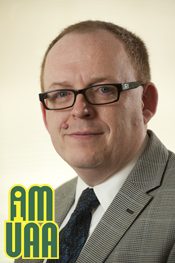I AM UAA: Fred A. Rainey, D.Phil.
by Kathleen McCoy |
Director of Biological Sciences
Hometown: Belfast, Northern Ireland
Fun Fact: Has passions for photography and world politics
 From Northern Ireland and England to New Zealand and Australia, from Germany to Louisiana
and Alaska: Dr. Fred A. Rainey has been around the world to study bacteria, archaea
and other microorganisms. For the last 15 years he has taught, led and researched
at Louisiana State University, but he was drawn to Alaska by the prospect of a new
place and a new challenge.
From Northern Ireland and England to New Zealand and Australia, from Germany to Louisiana
and Alaska: Dr. Fred A. Rainey has been around the world to study bacteria, archaea
and other microorganisms. For the last 15 years he has taught, led and researched
at Louisiana State University, but he was drawn to Alaska by the prospect of a new
place and a new challenge.
"Initially, my wife and I were just interested in trying somewhere different," he says. "And she actually had a job before I did, taking a position as a physician at the Alaska Native Medical Center. It was a great opportunity for her, and then this director position was created at UAA and I went for it."
The Department of Biological Sciences has become one of the largest units on campus, so leadership recently transitioned from the chair model to a directorship. With a rather large faculty (27 tenures, 10 term, 24 adjuncts and 5 post-doctorate researchers), the department has come to need a position focused on administration duties. Dr. Rainey will be responsible for the leadership and future direction of the department as well as scheduling classes, budgeting and overseeing the hiring of adjunct and term faculty. On top of those obligations, he will be teaching one course per semester as well.
"Teaching is one of the main missions of the university," he says. "Being involved in the classroom gives me a great connection to students, both in finding out how they feel about the department and what classes they might like to have available. It will also give me a connection to students who might be interested in undergraduate research."
Biological Sciences has continually strived to increase research productivity and external funding, and Dr. Rainey stresses the importance of undergraduate research specifically in relation to student success: "I think undergraduate research is really important for students to increase their chances of getting into either medical school or graduate programs as well as making them much more employable if they go into a field related to their degree immediately after graduation."
In addition to working to increase opportunities for undergrads, he will also be getting involved in other faculty research projects to add a microbiological component to those, as well as joining a team of researchers who are studying the recolonization of Kasatochi Island in the Aleutian chain. A volcanic eruption on Kasatochi in June 2008 led to total biological devastation when ash and debris wiped out an otherwise green terrain populated by bird colonies. The group will be documenting the process by which birds, plants and microorganisms return to the landscape.
Best known for his research in bacterial systematics, Dr. Rainey has accomplished a lot in his career. He first became interested in microbiology after high school in the early 1980s while working as a scientific officer for the Northern Ireland equivalent of the Department of Agriculture. That experience inspired him to study microbiology as an undergraduate at the University of Warwick England. From there, doctorate study at the University of Waikato in New Zealand, post-doctorate work in Australia and three years with the German Collection of Microorganism and Cell Cultures.
"My doctorate work came at the time of the end of the last oil crisis," he says. "There was motivation to look for organisms that could degrade cellulose and produce ethanol. I was looking specifically at organisms that could grow at high temperature in the hot springs in New Zealand-extremophiles, organisms that can survive at extreme environments, whether at high or low temperatures, or high or low pH levels, etc."
Currently, he is the associate editor of the International Journal of Systematic and
Evolutionary Microbiology, on the editorial board of the journal Extremophiles, chair
of Bergey's Manual Trust (a nonprofit dedicated to the dissemination of information
about the taxonomy of bacteria and archaea) and president of Bergey's International
Society of Bacterial Systematics.
You can find Dr. Rainey in the ConocoPhillips Integrated Science Building and online
at www.fredrainey.com. And you may even see his wife, Alanna M. Small, around campus
as well. Through her physician position at the Alaska Native Medical Center, she has
already been involved in working with this year's WWAMI students.
 "I AM UAA: Fred A. Rainey, D.Phil." is licensed under a Creative Commons Attribution-NonCommercial 4.0 International License.
"I AM UAA: Fred A. Rainey, D.Phil." is licensed under a Creative Commons Attribution-NonCommercial 4.0 International License.









